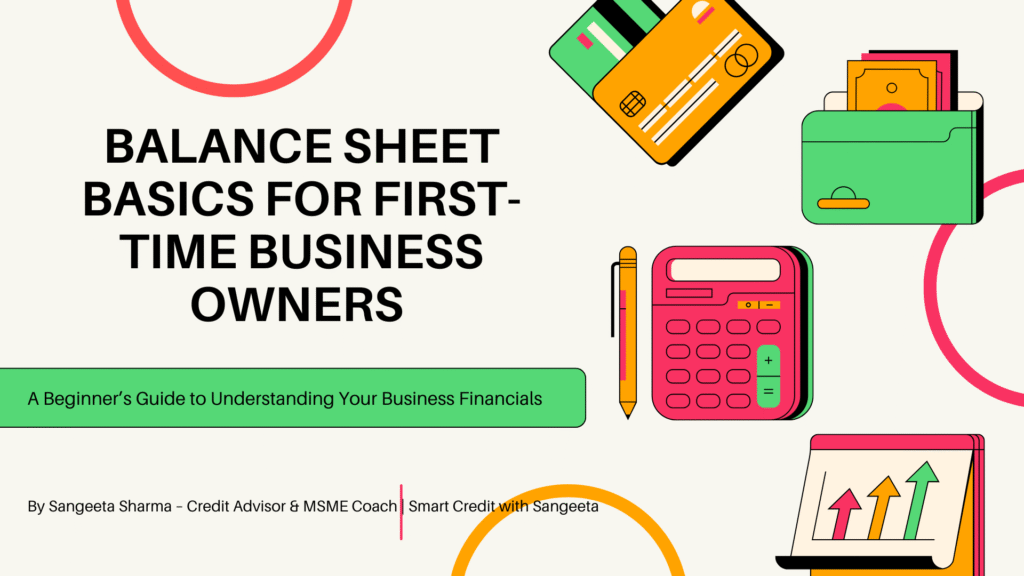By Sangeeta Sharma – Credit Advisor & MSME Coach | Smart Credit with Sangeeta

Introduction: Why Every Business Owner Must Understand the Balance Sheet
Running a business without understanding your balance sheet is like flying blind. You might be making money, but do you really know how your business is performing? Whether you’re an MSME owner, startup founder, or freelancer with growing income, your balance sheet is the mirror of your business health. Yet, many first-time entrepreneurs either avoid it or rely completely on their accountants.
In this blog, we’ll break it down in simple, easy to understand, and 100% practical terms.
What Is a Balance Sheet?
A balance sheet is a financial snapshot of your business on a particular date. It shows:
- What you own (Assets)?
- What you owe (Liabilities)?
- What’s left for you (Equity or Net Worth)?
In short:
Assets = Liabilities + EquityThis equation always balances therefore it is called Balance Sheet.
3 Key Components of a Balance Sheet
Let’s break them down with simple examples :
1. Assets: What Your Business Owns
These are your business resources the things that help you earn money. For example:
- Cash in hand or bank
- Inventory (stock)
- Equipment or machinery
- Receivables (customers who haven’t paid yet)
- Office space or property (if owned)
Example:
If you sell garments and you have ₹2 lakhs worth of stock + ₹1 lakh in your bank = these are assets.
2. Liabilities: What Your Business Owes
These are your financial obligations i.e. things you have to repay back. For example:
- Business loans
- Outstanding payments to vendors / Creditors
- Credit card dues
- Advance received from customers (to be fulfilled)
- Unsecured loans from friends and relatives
Example:
If you took a ₹5 lakh business loan and owe ₹1 lakh to suppliers = total liabilities ₹6 lakh.
3. Owner’s Equity (Your Net Worth)
This is what belongs to you, the business owner, after paying off liabilities. It includes:
- Initial capital you invested
- Profit earned (retained earnings)
Formula:
Equity = Assets – LiabilitiesWhy the Balance Sheet Matters for MSMEs
Here’s why understanding your balance sheet is not optional:
Bank Loan Approvals – Lenders want to see your financial strength.
Investor Trust – Investors judge your business value and risk through it.
Decision-Making – Helps you plan expansion, buy equipment, or reduce debt.
Tax & Compliance – Helps file accurate returns and maintain transparency.
Common Balance Sheet Mistakes by First-Time Business Owners
– Mixing personal and business finances
– Ignoring receivables and payables tracking
– Not recording depreciation
– Taking too much debt without checking net worth
– Not updating balance sheet monthly or quarterly
Quick Tip: Ask Yourself 3 Questions While Reviewing Your Balance Sheet
- Are my current assets more than my current liabilities?
→ This shows your liquidity. - Is my debt too high compared to equity?
→ This shows your financial risk. - Has my equity grown over time?
→ This shows your business value creation.
Sample Balance Sheet (Simplified for MSMEs)
| Particulars | Amount (₹) |
|---|---|
| Assets | |
| Cash in Bank | 1,00,000 |
| Inventory | 2,50,000 |
| Debtors (Receivables) | 50,000 |
| Machinery | 3,00,000 |
| Total Assets | 7,00,000 |
| Liabilities | |
| Bank Loan | 4,00,000 |
| Creditors | 1,00,000 |
| Total Liabilities | 5,00,000 |
| Owner’s Equity | 2,00,000 |
Assets = Liabilities + Equity
₹7,00,000 = ₹5,00,000 + ₹2,00,000
Free Resource for You: Balance Sheet Decoder
Want to decode your own balance sheet with ease?
Download your free MSME Balance Sheet Decoder here:
[Download Here]
Final Thoughts: Own Your Numbers
Understanding your balance sheet is not just for accountants it’s a skill that every entrepreneur must learn. The earlier you start, the better decisions you’ll make and the stronger your financial confidence will be.
Don’t be afraid of numbers start small, start today.
Read Next on Smart Credit with Sangeeta:
- What is a CMA Report and Why MSMEs Need It
- How to Make Your MSME Bank-Ready in 30 Days
- Top 5 Red Flags That Can Kill Your Business Loan Approval
Have Questions?
Drop your doubts or share your experience in the comments below. Or message me directly on WhatsApp Channel.
🖊️ Author Bio:
Sangeeta Sharma is a former Credit Officer turned MSME Coach, with over 11 years of experience in credit assessment. Through her platform Smart Credit with Sangeeta, she educates MSMEs and finance professionals with simplified tools, templates, and real-life insights.
